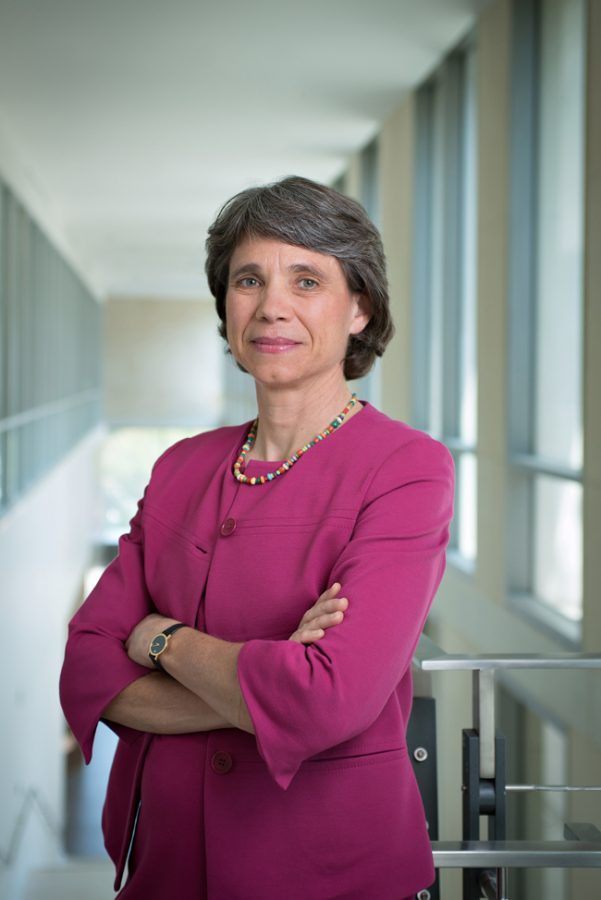Editor’s Note: Sharon Wood took over as dean of the Cockrell School of Engineering on Sept. 1. Starting October 2013, she had served as interim dean after current Provost Gregory Fenves’ promotion. The Daily Texan editorial board sat down with her recently in the first of a number of interviews with the University’s 18 school and college deans to sound her out on a number of issues of concern to students. Responses have been edited for length and clarity.
The Daily Texan: What would you say your main goals are for Cockrell as you get started with this new position?
Sharon Wood: We have a lot of traditional classes now where it’s lecture-based, and I don’t think that’s necessarily the most effective in trying to engage students in engineering. We want to move to having more project-based classes and hands-on learning opportunities. The trouble is right now, we’re constrained very much by our facilities. So when the EERC [Engineering Education and Research Center] opens, we will be able to have new labs that the students will be able to use for this … That’s the number one goal, is really to try to enhance the educational experience for the undergrads.
DT: And how about for graduate students?
Wood: The north tower is going to be focused on interdisciplinary research, and right now, if you have an interdisciplinary team of faculty, we’re so tight on space. It’s hard to get all the grad students together. They’re in their departments, but they’re doing interdisciplinary research, so they don’t have as many interactions as they really should.
DT: Could you tell us a little bit more about the importance of the EERC?
Wood: The EERC is really essential for us right now because we’re basically beyond capacity of all of our facilities. We had ENS, which they’re going to start tearing down in a couple months, where we had essentially large empty spaces — almost an entire floor — because we couldn’t provide the power for it … We were trying to do cutting edge research in a building that just couldn’t accommodate it.
DT: It’s very commonly known that the number of women in science majors is a lot lower than men, so what are you doing to help close that gap?
Wood: Both last year and this year, we have an all-time record high of female undergraduate students in the Cockrell school, and the percentage of female students is a record high … Our Women in Engineering Program, which has been around for about 25 years, has been incredibly successful in reaching out to K-12 students, showing them that engineering is an exciting career opportunity … Sometimes you can attract women to come into engineering, but then they get discouraged, so [Women in Engineering runs] … all kinds of programs to help women, support women throughout their entire time here, so that they build a community … The school for many years has been really aggressive in trying to find female faculty members, because if you’re a young women coming into the school, and all the role models are male, you start questioning, “Well, should I be here?” but we are in some departments, we’re up over 20 percent female faculty.
DT: So switching gears a little bit, what sort of collaboration do you hope to see between Cockrell and the new medical school?
Wood: We think there’s a tremendous opportunity to work with the Dell Medical School … They’re just in the process of selecting department chairs right now … They have to have kind of a sense of who will be hired before they can really start making commitments on research. But we do have opportunities for joint hires and that sort of thing, which I think will help build that synergy with the med school.
DT: What sorts of opportunities are available to engineering undergraduates who want to do research?
Wood: The model across campus is what Natural Sciences does. They have that Freshman Research Initiative program. We don’t have an organized program like that, but we do have a large percent of our students who are engaged in research in the laboratories … The reason why research is exciting is because the solution isn’t known, and so the attempts you make and the path you take to get to a solution is almost as important as coming up with a solution itself.
DT: The whole state is pushing four-year graduation rates a lot. What do y’all do particularly in your college, because engineering is a very difficult major?
Wood: It is a difficult major, and I think the culture was, “Oh, if I finish in five years or six years, it’s not that big a deal.” So we’ve really tried to focus on four-year graduations … We’ve taken a look at the courses where we have the highest number of students who get lower than a C … We’re putting extra resources into those… They were all outstanding students in high school, and they hit the first roadblock, and they think, “Oh, maybe engineering isn’t for me.” We’re trying to show them that, “No, if you work a little harder, you can probably get through that, and you’re going to be a great engineer.”
















